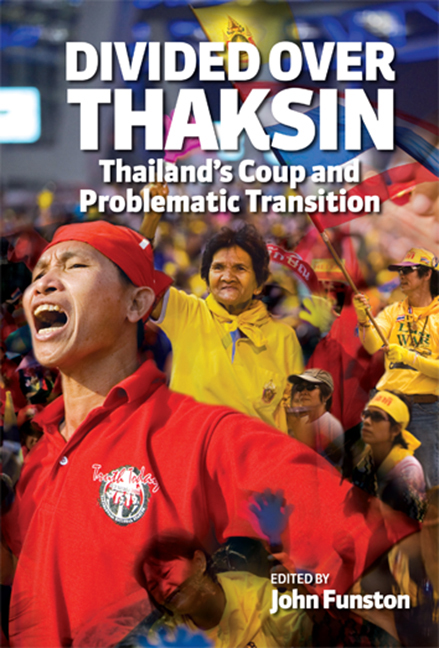Book contents
- Frontmatter
- Contents
- List of Tables and Figures
- List of Contributors
- Preface
- Introduction
- 1 Political Contests in the Advent of Bangkok's 19 September Putsch
- 2 The Tragedy of the 1997 Constitution
- 3 The NESAC, Civil Society, Good Governance and the Coup
- 4 Military Coup and Democracy in Thailand
- 5 Deconstructing the 2007 Constitution
- 6 Thailand's 2007 Constitution and Re-Emerging Democracy: Will Political Polarization Continue?
- 7 Untying the Gordian Knot: The Difficulties in Solving Southern Violence
- 8 Another Country: Reflections on the Politics of Culture and the Muslim South
- 9 Governance in the South: Is Decentralization an Option?
- 10 Tradition and Reform in Islamic Education in Southern Thailand
- 11 The Economy under the Thaksin Government: Stalled Recovery
- 12 The Thai Economy after the Coup
- 13 The Impact of Political Uncertainty on Business
- Index
5 - Deconstructing the 2007 Constitution
Published online by Cambridge University Press: 21 October 2015
- Frontmatter
- Contents
- List of Tables and Figures
- List of Contributors
- Preface
- Introduction
- 1 Political Contests in the Advent of Bangkok's 19 September Putsch
- 2 The Tragedy of the 1997 Constitution
- 3 The NESAC, Civil Society, Good Governance and the Coup
- 4 Military Coup and Democracy in Thailand
- 5 Deconstructing the 2007 Constitution
- 6 Thailand's 2007 Constitution and Re-Emerging Democracy: Will Political Polarization Continue?
- 7 Untying the Gordian Knot: The Difficulties in Solving Southern Violence
- 8 Another Country: Reflections on the Politics of Culture and the Muslim South
- 9 Governance in the South: Is Decentralization an Option?
- 10 Tradition and Reform in Islamic Education in Southern Thailand
- 11 The Economy under the Thaksin Government: Stalled Recovery
- 12 The Thai Economy after the Coup
- 13 The Impact of Political Uncertainty on Business
- Index
Summary
Passions are inflamed currently in Thailand for reasons that are self-evident. The drafting of the new constitution has been a polarized rather than consensus-based affair, brought about by the fact that Thailand' sixteenth constitution (1997) — known as the People' Constitution — was overturned by a coup in 2006. Intriguingly, the current text of the proposed new constitution has fewer articles than the sixteenth constitution had, but it is longer in wording. It deserves to be deconstructed to reveal its constituents transparently.
The current draft is the eighteenth, after the seventeenth interim constitution imposed following the 19 September 2006 coup. It reaffirms the central role of the monarchy in the constitutional process. As it now stands, the proposed constitution reads a little better than a draft revealed a few months earlier. It shies away from the idea of a totally selected (appointed) Senate by opting instead for a mixture of selected (seventy-four in number) and elected (seventy-six) members, partly to appease those who feel that a totally selected body would simply not be credible. The earlier proposal to include the possibility of setting up a National Crisis Council, which would have provided even more elbow room for the military to administer the country in times of so-called national crisis, has also been omitted from the current draft.
However, when tested against both the form and substance of the 1997 constitution, there are key challenges at hand. As it stands, the draft is evidently a reaction against the previous government, which was embroiled in perceived or real conflicts of interest, personified by the media-magnate premiership ultimately ejected by military action.
On the one hand, there are some innovations of note. First, there are many limits imposed on the executive branch of government, especially the top-notch of the executive branch. For example, a person elected as prime minister cannot stay in power for more than eight years. The premier, the spouse and under-aged children must declare their assets fully, and they are not allowed to have a hand in companies, especially those in the media and telecommunications industry. A minimum of one-fifth of parliamentarians (Lower House) can propose a no-confidence vote against the prime minister, a lower number than the two-fifths rule under the sixteenth constitution.
- Type
- Chapter
- Information
- Divided Over ThaksinThailand's Coup and Problematic Transition, pp. 80 - 88Publisher: ISEAS–Yusof Ishak InstitutePrint publication year: 2009

